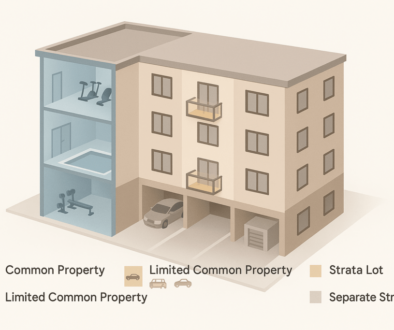What are the Required Strata Documents When Purchasing a Home in British Columbia
When purchasing a strata property in British Columbia—such as a condominium, townhouse, or other shared-property development—it is crucial to review the strata documents before finalizing an offer. These documents provide essential insights into the financial health, management, and overall condition of the strata corporation. Below is an overview of the strata documents typically included in the purchase process.
Form B: Information Certificate
The Form B Information Certificate is one of the most critical documents for prospective buyers. It provides a snapshot of the strata corporation’s financial status, management details, and any outstanding issues that could impact the buyer. Key details in the Form B include:
- Monthly strata fees
- Any special levies currently approved
- The amount in the Contingency Reserve Fund (CRF) that have been confirmed to date
- Any outstanding fines or fees associated with the unit
- Any resolutions pending to be approved
- Pending litigation involving the strata
- The most recent depreciation report (if available)
- The type of parking and storage and allocation if any
Strata Bylaws and Rules
The bylaws and rules govern the day-to-day operations of the strata property. These documents outline:
- Use and occupancy restrictions (e.g., short-term rentals, noise regulations, pet policies)
- Bylaws regarding renovations and alterations to units
- Parking and storage allocation policies
- Dispute resolution procedures between owners
- Governance structure and voting procedures for decision-making
Understanding these rules ensures that buyers are aware of any restrictions that may impact their lifestyle or investment goals.
Strata Meeting Minutes (At Least Two Years)
Meeting minutes from strata council meetings, annual general meetings (AGMs), and special general meetings (SGMs) provide insight into the internal workings of the strata. They highlight:
- Discussions about maintenance and repairs
- Financial concerns and upcoming special levies
- Disputes or complaints within the strata community
- Future projects and potential assessments
Reviewing past meeting minutes can help buyers assess the overall management and condition of the property.
Strata Financial Statements and Budget
These documents reveal the financial health of the strata corporation. They include:
- The annual operating budget
- Income and expense reports
- The current balance of the operating fund and CRF
- Any outstanding debts or loans
A well-managed strata should have a healthy CRF and a balanced operating budget to cover regular maintenance and unexpected repairs.
Depreciation Report
A depreciation report is a long-term maintenance and financial planning document. It assesses the expected lifespan of major building components (e.g., roof, elevators, plumbing) and estimates future costs for repair or replacement. Strata corporations with fewer than five units are not required to have this report, and others may choose to waive it, but its absence can indicate potential financial risks. A report is required to be done every 5 years.
Insurance Certificate
This document outlines the strata corporation’s insurance policy, including:
- Coverage for the building’s common property
- Liability insurance
- Deductibles for claims (which owners may be responsible for in some cases)
Buyers should compare the strata’s insurance policy with their personal insurance needs to ensure adequate coverage.
Engineer and Consultant Reports (If Available)
Some strata properties may have engineering or consultant reports related to structural integrity, building envelope issues, or other concerns. These reports provide an independent assessment of potential maintenance or repair needs.
Special Assessments and Levies
Any upcoming or potential special assessments should be disclosed within the strata documents. These are additional payments required from owners to cover unexpected repairs or major projects not included in the regular budget.
Legal Correspondence or Notices
If the strata corporation is involved in any legal disputes, this information is crucial for buyers. Lawsuits or legal claims can result in significant financial liabilities for owners if settlements or legal fees need to be covered through special assessments.
Reviewing strata documents thoroughly before purchasing a home in British Columbia helps buyers make informed decisions and avoid unexpected financial or legal issues. It is advisable to work with a real estate professional or legal expert to interpret these documents effectively. A well-managed strata with strong financials and transparent governance contributes to a stable and desirable home investment.





